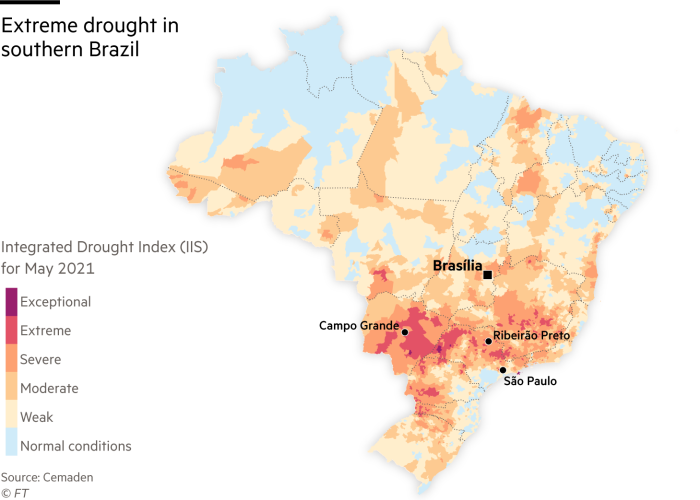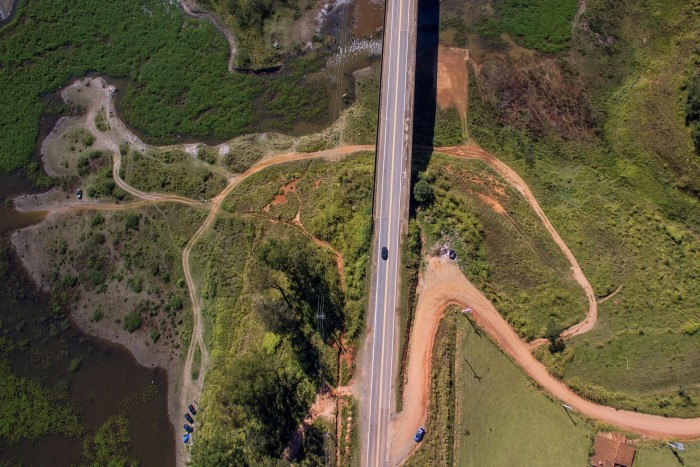[ad_1]
The worst drought in almost a century has left millions of Brazilians facing water shortages and the risk of power blackouts, complicating the country’s efforts to recover from the devastating impact of the coronavirus pandemic.
The agricultural centres in São Paulo state and Mato Grosso do Sul have been worse affected, after the November-March rainy season produced the lowest level of rainfall in 20 years.
Water levels in the Cantareira system of reservoirs, which serves about 7.5m people in São Paulo city, dropped to below one-tenth of its capacity this year. Brazil’s mines and energy ministry has called it country’s worst drought in 91 years.
“Lately we’ve been without water every other day, but it was usually at night. But on Thursday we had no water all day,†said Nilza Maria Silva Duarte from São Paulo’s working class east zone.
José Francisco Goncalves, an ecology professor at the University of BrasÃlia, said the drought was having a devastating effect on the important farming industry, which accounts for about 30 per cent of gross domestic product.
“The lack of water in the rivers and reservoirs means farmers won’t be able to irrigate their lands, which will lead to a fall in agricultural production,†he said.
He predicted the drought would “fuel inflation and commodity prices on a global scale, and decrease Brazilian GDP. It has direct repercussions.â€
Jose Odilon, a farmer from Ribeirão Preto, a booming agricultural hub in the interior of São Paulo state, said his sugarcane crop had been badly affected.
His vast plantation is dotted with heavy farming equipment — much of it automated — to strip the cane of its leaves, harvest the stalk and then dump it into an awaiting fleet of Mercedes lorries for transport to the local mills.
“We’re going to suffer more due to the lack of moisture in the soil,†he explained. “This is really hindering development.â€
Odilon blamed an inversion of the La Nina weather pattern, which has meant more rain falling on the Amazon basin and less in the country’s south.

Marcelo Laterman, a climate campaigner from Greenpeace Brazil, said the drought was “directly connected†to deforestation in the Amazon, which last year surged to its highest level in more than a decade. The forest’s water recycling system plays a vital role in distributing rainfall across South America.
As hydroelectric power accounts for about 65 per cent of Brazil’s electricity mix, the drought has also curtailed electricity production. This has forced a switch to the more expensive thermal power, pushing electricity prices for businesses and consumers up to 40 per cent higher this year, according to estimates.
“Our current model based on hydroelectric and thermal energy is not sustainable,†Laterman said. “The increase in droughts puts pressure on the reservoirs of hydroelectric plants and the answer we have is the activation of thermoelectric plants — which, in addition to being expensive, increases greenhouse gas emissions and worsens the problem.â€
Brazil’s government has issues warnings of possible blackouts, stoking fears that energy use will be rationed. Local media have reported that the government was preparing a decree on rationing to control electricity use in times of shortages. The ministry of mines and energy said it was discussing energy rationing with “large consumers and industry for times of greater energy demand.â€
Silva Duarte said: “Our electricity bill is definitely more expensive, and I don’t know how we’re going to manage because our salary hasn’t increased. They said prices will increase further. Where will it stop?â€
The drought comes as Brazil grapples with the economic and social effects of the pandemic. Almost half a million Brazilians have died from Covid-19, the second worst of any country after the US, and the death rate remains above 2,000 per day.
The country’s vaccine rollout has also lagged and is only starting to gather pace. Just over a quarter of Brazil’s 212m people have now received a first shot.
With consumer prices increasing more than 8 per cent in the year to May, inflation has combined with high levels of unemployment to hit the nation’s poorest citizens.
Less than half of Brazilians now have access to adequate food all the time, with 19m people, or 9 per cent of its inhabitants, facing hunger, according to a the Brazilian Research Network on Food and Nutritional Sovereignty and Security.
[ad_2]
Source link







